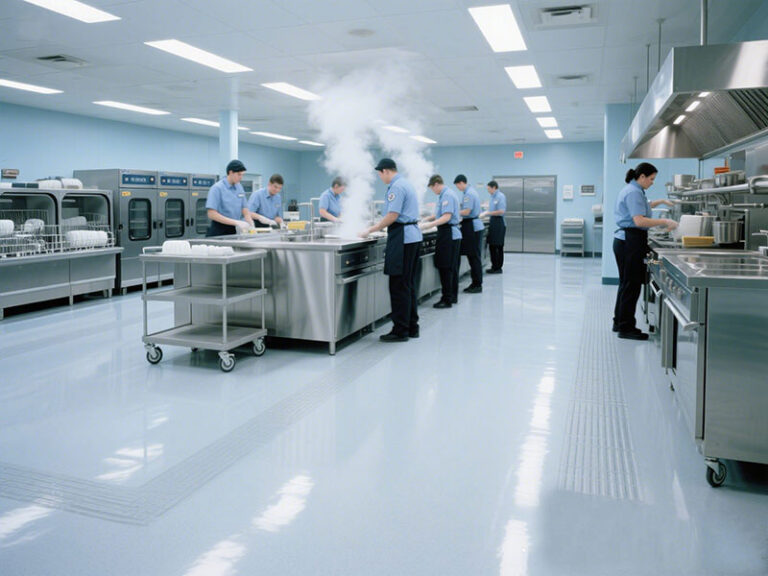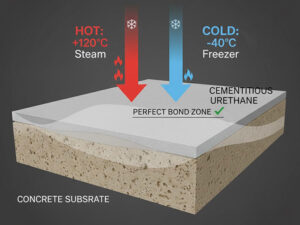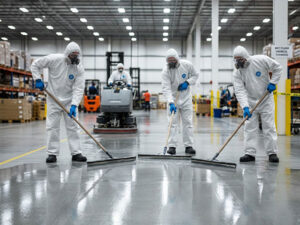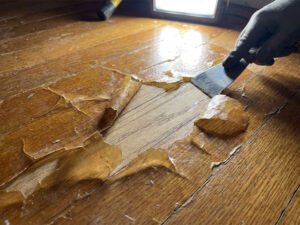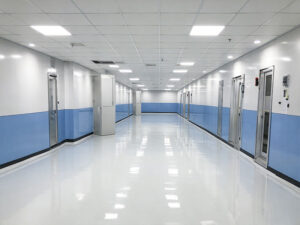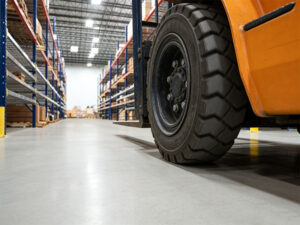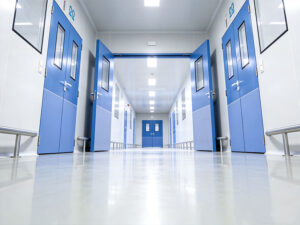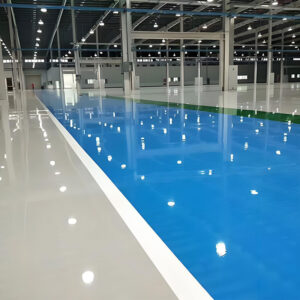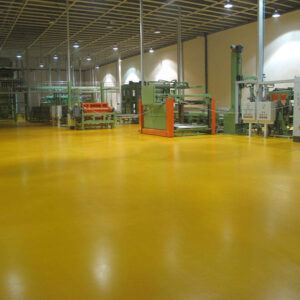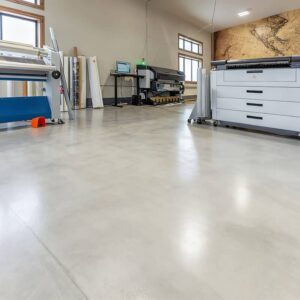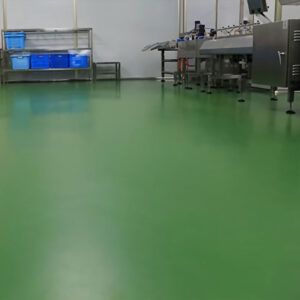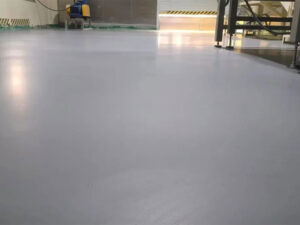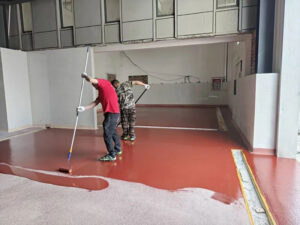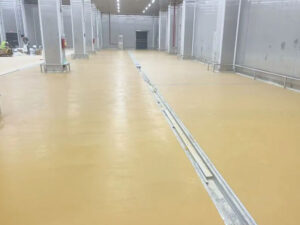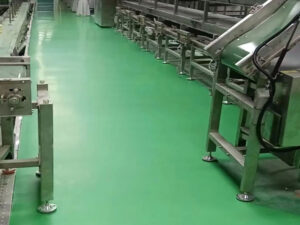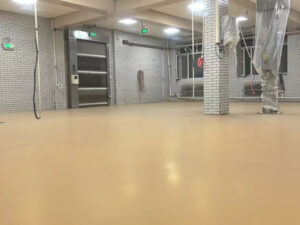Introduction
In today’s home decoration and commercial space design, epoxy kitchen floors are gradually becoming a favored choice. With their unique advantages, such as wear resistance, chemical corrosion resistance, and easy cleaning, they demonstrate excellent performance in the special environment of the kitchen. However, for many customers with such engineering projects, the cost of installing an epoxy kitchen floor is one of their most concerned issues. This article will delve into the cost components of installing an epoxy kitchen floor and provide you with a comprehensive and detailed reference.
Overview of Epoxy Kitchen Floors
What is an Epoxy Kitchen Floor?
An epoxy kitchen floor is a high – performance flooring material mainly made of epoxy resin, with corresponding curing agents, additives, etc. added. It usually forms a strong and seamless coating on the ground through construction techniques such as roller coating and troweling. Its main components include epoxy resin, curing agents, pigments, fillers, etc. These components work together to endow the epoxy kitchen floor with excellent performance.
Features and Advantages of Epoxy Kitchen Floors
- Good wear resistance: The kitchen is an area with high usage frequency in a family or commercial place. Epoxy kitchen floors can withstand frequent walking, cart pushing, and other frictions, and are not easy to wear, ensuring the long – term use of the floor.
- Chemical corrosion resistance: In the kitchen, various cleaning agents, oils, acids, and alkalis are often encountered. Epoxy kitchen floors have good chemical corrosion resistance and can effectively resist the erosion of these substances, maintaining the integrity and aesthetics of the floor.
- Easy to clean: Due to its seamless surface structure, dust, stains, etc. are not easy to accumulate on the floor. It is very convenient to clean, and only needs to be wiped with a damp cloth.
- Aesthetically diverse: Epoxy kitchen floors can be formulated into various colors and patterns according to customers’ needs, meeting different decoration styles and personalized requirements, making the kitchen more beautiful and elegant.
- Anti – slip performance: By adding anti – slip agents or using special surface treatment processes, epoxy kitchen floors can have good anti – slip performance, reducing the risk of slipping in the kitchen and ensuring the safety of users.
Types of Epoxy Kitchen Floors
- Epoxy thin – coat floors: The coating is relatively thin, generally with a thickness between 0.2 – 0.5 mm. The construction process is relatively simple, and the cost is low. It is suitable for kitchens with low requirements for surface flatness and decoration, such as some small family kitchens or warehouse kitchens.
- Epoxy mortar floors: The design of the intermediate coating and mortar layer gives it good wear resistance and compressive capacity. The coating thickness can be adjusted to 1 – 5 mm according to specific requirements. It is suitable for kitchens in manufacturing workshops of electrical appliances, electronics, machinery, etc., as well as kitchen aisles that need to bear heavy vehicles such as forklifts and cars.
- Epoxy self – leveling floors: The coating thickness can reach 1.5 – 5 mm as required, and the design requirements are achieved by adjusting the thickness of the intermediate coating and the surface layer. This self – leveling floor is usually used in kitchens with high requirements for flatness and appearance, such as commercial restaurant kitchens and hotel kitchens. It can be constructed quickly to form a smooth and flat surface, with excellent decoration effects and cleanliness.
- Epoxy anti – static floors: In addition to the performance of ordinary epoxy floors, it also has anti – static functions. It is often used in kitchens of electronic factories, laboratories, etc., where there are strict requirements for static electricity. Anti – static materials need to be added during the construction process, and special grounding treatment is required.
- Water – based epoxy floors: An environmentally friendly flooring product, characterized by water – dispersible epoxy floor coatings. It has the advantage of low volatile organic compound (VOC) emissions, is friendly to the environment and human health, and is suitable for kitchen places with high environmental protection requirements.
Factors Affecting the Installation Cost of Epoxy Kitchen Floors
Material Costs
- Epoxy coatings: Epoxy coatings are the main material for epoxy kitchen floors, and their prices vary depending on factors such as brand, quality, and type. Generally, the price of domestic ordinary epoxy resin is about 15 – 20 yuan per kilogram, while the price of imported high – quality epoxy resin can reach 30 – 50 yuan per kilogram or even higher. Different types of epoxy coatings, such as thin – coat type, self – leveling type, and anti – static type, also have different prices. For example, the price of self – leveling epoxy floor paint is generally about 80 – 120 yuan per square meter, while the price of acid – and alkali – resistant epoxy floor paint is relatively high, generally between 150 – 200 yuan per square meter.
- Primers, topcoats, and other materials: In addition to epoxy coatings, auxiliary materials such as primers, topcoats, curing agents, pigments, and fillers are also required. The function of the primer is to enhance the adhesion between the ground and the epoxy coating, and the topcoat determines the final appearance and performance of the floor. Curing agents are used in conjunction with epoxy resin, and different types of curing agents also have an impact on the floor performance and price. The price of ordinary curing agents is relatively low, while the price of some special – function curing agents, such as fast – drying type and high – temperature – resistant type, will be higher, usually between 15 – 20 yuan per kilogram. The quality and types of pigments and fillers also affect the cost. High – quality pigments have bright and long – lasting colors and relatively high prices. Commonly used fillers such as quartz sand and calcium carbonate have different prices due to differences in particle size and purity.
Area Size
The kitchen area is one of the important factors affecting the installation cost. Generally speaking, large – area construction can reduce the cost per unit area because certain economies of scale can be obtained in material procurement, construction equipment leasing, etc. For example, in some large commercial kitchens, due to the large construction area, material suppliers may offer certain price discounts, and the labor cost of the construction team can also be relatively shared, thereby reducing the installation cost per square meter. On the contrary, the installation cost of a small kitchen may be relatively high because some fixed costs, such as the transportation cost of construction equipment and the entry fee of the construction team, will increase the cost per square meter when the total area is small.
Ground Conditions
- Flatness: If the ground flatness is poor, pre – treatment work such as ground grinding and repair is required, which will increase the construction time and material consumption, thus increasing the cost. Generally, for every 5 – mm error in ground flatness, the treatment cost per square meter may increase by 5 – 10 yuan. For example, if there are large unevenness on the ground, more epoxy repair agents are needed for filling, and the workload of grinding the ground will also increase, resulting in an increase in material and labor costs.
- Hardness: Insufficient ground hardness will lead to a decrease in the adhesion of the epoxy floor and may easily cause problems such as hollowing and peeling. For the ground with low hardness, hardening treatment, such as using a concrete sealant, may be required first, which will also increase the cost. In addition, factors such as the humidity and cleanliness of the ground will also affect the construction effect and cost. If the ground is wet, drying treatment is required; if there are oil stains, dust, and other impurities on the ground, thorough cleaning is required, which will increase additional workload and cost.
Design and Patterns
- Cost difference between simple designs and complex patterns: A simple solid – color epoxy kitchen floor design has a relatively simple construction process and low cost. However, complex patterns, patterns, or customized designs require higher construction techniques and more materials, and the cost will increase accordingly. For example, patterns made of colored epoxy sand or artistic epoxy floor paint require precise construction techniques and professional technicians, and the selection and preparation of materials are also more complex, so the cost will be much higher than that of a simple design.
- Additional costs of customized designs: If customers have special customization requirements, such as company logos and brand patterns, special design and production are required, which will generate additional design fees and production costs. In addition, customized designs may also require the use of special materials or processes, further increasing the cost.
Labor Costs
- Charging standards of installation workers: Labor cost is an important part of the installation cost of epoxy kitchen floors. The charging standards of installation workers vary depending on factors such as region, experience, and skill level. Generally speaking, the labor cost in first – tier cities and economically developed regions is relatively high, while the labor cost in second – and third – tier cities and economically underdeveloped regions is relatively low. Experienced and skilled installation workers also charge relatively higher fees because they can ensure the construction quality and efficiency. For example, in some big cities, the daily wage of epoxy floor installation workers may be about 300 – 500 yuan, while in some small cities or rural areas, the daily wage may be about 150 – 300 yuan.
- Impact of regional differences on labor costs: Factors such as the economic development level and the supply – and – demand relationship of the labor market in different regions will lead to differences in labor costs. In some regions with abundant labor resources, the labor cost is relatively low; while in some regions with a shortage of labor, the labor cost will be relatively high. In addition, the price level of the region will also affect the labor cost. In regions with a high price level, the living cost of workers will also increase accordingly, resulting in an increase in the labor charging standard.
Estimation of the Installation Cost of Epoxy Kitchen Floors
Average Cost Range
- Installation costs of different types and qualities of epoxy floors: According to market research and actual case analysis, the installation costs of different types and qualities of epoxy kitchen floors are roughly as follows:
- Epoxy thin – coat floors: The installation cost per square meter is generally between 20 – 50 yuan, suitable for kitchens that are cost – sensitive and have low requirements for the floor.
- Epoxy mortar floors: The installation cost per square meter is about 30 – 80 yuan, suitable for kitchens that need to bear a certain amount of pressure and wear.
- Epoxy self – leveling floors: The installation cost of ordinary self – leveling floors per square meter is between 50 – 150 yuan. The price of colored self – leveling or artistic self – leveling floors is higher, up to 120 – 200 yuan per square meter, suitable for kitchens with high requirements for flatness and aesthetics.
- Epoxy anti – static floors: The installation cost per square meter is between 60 – 200 yuan, mainly used in kitchens with strict requirements for static electricity.
- Water – based epoxy floors: Due to their environmental protection characteristics, the price is relatively high, and the installation cost per square meter is between 80 – 200 yuan.
- Average cost after comprehensively considering various factors: Comprehensively considering factors such as material cost, area size, ground conditions, design and patterns, and labor cost, the average installation cost of epoxy kitchen floors is between 80 – 150 yuan per square meter. However, this is only a rough estimate, and the actual cost may vary depending on the specific situation. For example, if the kitchen ground condition is poor and a large amount of pre – treatment work is required; or if the customer requires a complex design and pattern, the installation cost may exceed this range. On the contrary, if the kitchen area is large, material procurement and construction can obtain economies of scale, and the installation cost may be relatively low.
Cost Comparison
- Cost comparison with other types of kitchen floors: Compared with traditional kitchen floor materials such as tiles and wooden floors, the cost of epoxy kitchen floors has certain advantages in some aspects and is relatively high in some aspects.
- Tiles: The price range of tiles is relatively wide. The price of ordinary tiles is between 30 – 100 yuan per square meter, but when adding the labor cost of tiling and auxiliary material costs, the total cost may be similar to that of an epoxy kitchen floor. However, tiles have gaps, which are easy to accumulate dirt and are relatively difficult to clean. After a period of use, problems such as wear and cracking may occur, requiring replacement or repair, increasing the后期 maintenance cost. In contrast, the seamless surface structure of epoxy kitchen floors is convenient to clean, has good wear resistance, and low maintenance cost.
- Wooden floors: The price of wooden floors varies greatly. The price of solid – wood floors per square meter may be 200 – 500 yuan or even higher, and the price of composite wooden floors is relatively low, between 80 – 200 yuan. Wooden floors need regular maintenance, such as waxing and moisture – proofing, and the maintenance cost is high. Moreover, wooden floors are not resistant to water and fire. When used in the wet and water – rich environment of the kitchen, problems such as deformation and mildew are likely to occur. In comparison, epoxy kitchen floors have better water resistance and fire resistance and are more suitable for the kitchen environment.
- Cost – performance analysis of epoxy floors: Although the initial installation cost of epoxy kitchen floors may be relatively high, in the long run, their cost – performance ratio is relatively high. Epoxy kitchen floors have a long service life, generally 5 – 10 years or even longer, reducing the frequency and cost of floor replacement. At the same time, their characteristics of easy cleaning, wear resistance, and chemical corrosion resistance reduce the post – maintenance cost. In addition, the aesthetic diversity and personalized customization functions of epoxy kitchen floors can enhance the overall decoration effect and value of the kitchen, bringing better user experience and economic benefits to customers.
Advantages of JINYU PAINT Brand
Brand Introduction
JINYU PAINT is an enterprise specializing in the research, development, production, and sales of coatings. It was established in [specific year] and has many years of experience and a good reputation in the coating industry. The company has advanced production equipment and a technical R & D team, and is committed to providing customers with high – quality, environmentally friendly coating products and solutions. Its products are widely used in many fields such as construction, industry, and home, and have a high degree of popularity and market share in the market.
Product Features
- Quality and performance of JINYU PAINT epoxy coatings: JINYU PAINT’s epoxy coatings use high – quality raw materials and advanced production processes, and have good wear resistance, chemical corrosion resistance, adhesion, and flexibility. Its products have passed strict quality inspections and meet relevant national standards and industry requirements, and can provide reliable protection and beautiful effects for epoxy kitchen floors. For example, JINYU PAINT’s epoxy self – leveling coatings have excellent leveling and gloss properties and can form a smooth and flat surface; epoxy thin – coat coatings have good covering power and scrub resistance and can effectively resist daily wear and stains.
- Environmental protection and safety standards: The company attaches great importance to environmental protection and safety. Its epoxy coating products meet national environmental protection standards, have low volatile organic compound (VOC) emissions, and are friendly to the environment and human health. In the production process, relevant safety regulations and operating procedures are strictly followed to ensure the quality and safety of the products. For example, JINYU PAINT’s water – based epoxy coatings use water as a solvent, do not contain harmful substances, and are a green and environmentally friendly coating product, suitable for use in family kitchens and other places with high environmental protection requirements.
Service Advantages
- Professional installation team and service process: JINYU PAINT has a professional installation team. They have undergone strict training and assessment and have rich construction experience and professional skills. In the installation process of epoxy kitchen floors, the installation team can operate according to the standard construction process to ensure the construction quality and progress. At the same time, the company also provides all – round pre – sales, in – sales, and after – sales services, answering customers’ questions, providing technical support, and solutions. For example, before construction, professional technicians will conduct a detailed survey and evaluation of the kitchen ground and formulate a reasonable construction plan for customers; during the construction process, the installation team will communicate with customers in a timely manner and feedback the construction progress; after the construction is completed, the company will conduct a quality inspection and provide a certain period of warranty service.
- After – sales guarantee and customer support: JINYU PAINT provides customers with a complete after – sales guarantee service. If there are quality problems within the warranty period, the company will promptly arrange for repair or replacement. At the same time, the company has also established a customer feedback mechanism to timely understand customers’ needs and opinions and continuously improve and enhance the service quality. In addition, the company also provides regular return visit services, providing customers with suggestions and guidance on floor maintenance and extending the service life of the floor.
Case Sharing
Actual Project Cases
- Small family kitchen case: A small family kitchen has an area of about 10 square meters. The ground flatness is good, but the hardness is average. The customer chose JINYU PAINT’s epoxy thin – coat floor in a light – gray color with a simple and generous design. Before construction, the ground was simply ground and cleaned, and then the epoxy primer, intermediate coating, and topcoat were applied. The entire construction process took 2 days. The material cost was about 800 yuan, the labor cost was about 500 yuan, and the total installation cost was about 1300 yuan, with a cost of about 130 yuan per square meter. After the construction was completed, the kitchen floor presented a smooth and clean effect, which was in harmony with the overall decoration style of the kitchen. After a period of use, the wear – resistant and easy – to – clean features of the floor were recognized by the customer, and the customer was very satisfied with this decoration.
- Large commercial kitchen case: A large commercial restaurant kitchen has an area of about 200 square meters. The ground flatness is poor, with some cracks and unevenness. The customer requested to use JINYU PAINT’s epoxy self – leveling floor in a dark – gray color to create a high – end and professional kitchen atmosphere. Before construction, the ground was comprehensively ground, repaired, and hardened, and then a conductive copper mesh was laid (because there are some electronic equipment in the kitchen and anti – static function is required). Then, the epoxy primer, intermediate coating, anti – static putty were applied, and finally the anti – static self – leveling topcoat was troweled. The entire construction process took 7 days. The material cost was about 30,000 yuan, the labor cost was about 15,000 yuan, and the total installation cost was about 45,000 yuan, with a cost of about 225 yuan per square meter. After the construction was completed, the kitchen floor surface was smooth and flat, with good anti – static performance and wear resistance, meeting the usage requirements of the commercial kitchen. After the restaurant opened, the aesthetics and practicality of the floor were well – received by customers and employees, providing strong support for the restaurant’s operation.
Customer Reviews
Many customers who have chosen JINYU PAINT’s epoxy kitchen floors have highly evaluated its products and services. Customers generally believe that JINYU PAINT’s epoxy coatings are of reliable quality, the construction team is professional and responsible, and the installation effect is beautiful and durable. At the same time, the company’s after – sales service is also very in – place and can promptly solve the problems encountered by customers during use. For example, a customer wrote in the review: “Choosing JINYU PAINT’s epoxy kitchen floor was a very wise decision. The quality of the floor is very good, it is wear – resistant and easy to clean, making our kitchen look brand new. The construction team is also very professional, there were no problems during the construction process, and the after – sales service is very considerate. Any problems can be solved in a timely manner.” Another customer said: “JINYU PAINT’s epoxy self – leveling floor has added a lot of highlights to our commercial kitchen. The flatness and gloss of the floor are very good, and the anti – static performance is also excellent, fully meeting our needs. We will choose JINYU PAINT for similar projects in the future.”
Conclusion
In summary, epoxy kitchen floors have become the first choice for many customers in kitchen decoration due to their unique advantages, such as wear resistance, chemical corrosion resistance, easy cleaning, and aesthetic diversity. However, their installation cost is affected by many factors, including material cost, area size, ground conditions, design and patterns, and labor cost. When choosing an epoxy kitchen floor, customers should comprehensively consider these factors according to their actual needs and budgets and choose the appropriate floor type and brand. As a professional coating enterprise, JINYU PAINT’s epoxy coating products have good quality and performance, meet environmental protection and safety standards, and also provide a professional installation team and a complete after – sales service, which can provide customers with high – quality epoxy kitchen floor solutions. Through reasonable cost control and high – quality product services, customers can obtain a high cost – performance ratio and a good user experience while meeting the kitchen usage requirements.
If you are considering installing an epoxy floor for your kitchen or still have questions about the installation cost and related issues of epoxy kitchen floors, welcome to contact JINYU PAINT at any time. Our professional team will provide you with detailed consulting services and personalized solutions to help you create a beautiful, practical, and environmentally friendly kitchen space. Contact phone number: [specific phone number], email: [specific email address]. Let’s start your high – quality kitchen decoration journey together!
